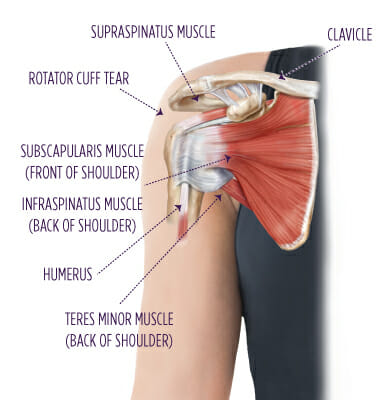
Anatomy of the Rotator Cuff
The rotator cuff is made up of four muscles and tendons that stretch from the shoulder blade (scapula) to the upper arm bone (humerus). They move and stabilize the shoulder as it travels through various ranges of motion.
The rotator cuff performs two main functions:
- It starts the shoulder’s movement when the arm is moved away from the body
- It pulls the upper-arm bone and shoulder blade together, keeping them in close contact as the shoulder moves
The most commonly injured rotator cuff muscle is the supraspinatus. This is in part because this muscle’s tendon passes through a very narrow space between the top of the upper arm bone and the underside of the shoulder’s top (acromion).
Learn more about shoulder anatomy.
What Causes a Rotator Cuff Injury?
A rotator cuff tear may result from several causes, including:
- An acute injury, such as a fall
- Chronic wear and tear on the joint, damaging the rotator cuff tendons
- Lifting heavy objects over your head
- Stress from repetitive activities
- Bone spurs
There are varying degrees of rotator cuff tears, including tears in the tendon, muscle belly, or at the muscle’s insertion point on the bone.
What Are the Symptoms of a Rotator Cuff Injury?
Symptoms of rotator cuff injuries include:
- Pain in the shoulder and during the night
- Painful clicking and/or popping sensations
- Pain and/or weakness with certain movements
- Pain that radiates into the upper arm
- Inability to rotate the arm and hand behind the back
How Are Rotator Cuff Injuries Diagnosed?
The diagnostic process starts by talking with you about your symptoms and conducting a detailed physical examination. Diagnostic imaging, including X-rays and MRI scans, can be useful for a diagnosis as well.
How Are Rotator Cuff Injuries Treated Nonsurgically?
Many rotator cuff tears can be treated nonsurgically. The goals of treatment are to relieve pain and restore strength to the involved shoulder. Nonsurgical treatment options include:
- Anti-inflammatory medication
- Steroid injections
- Physical therapy
What Are the Surgical Treatment Options for Rotator Cuff Injuries?
If a nonsurgical approach doesn’t provide satisfactory function, or if you are active and use your arm for overhead work or sports, then surgery is most often recommended because many tears will not heal without surgery.
Most of the time, arthroscopic (minimally invasive) surgery is appropriate. However, some large rotator cuff tears may require traditional surgery, using a long incision to repair the torn tendon.
Learn more about rotator cuff surgery.
Experiencing Shoulder Pain?
Find a Summit Orthopedics shoulder specialist near you to get a diagnosis and customized treatment plan.
Find a Physician ›
